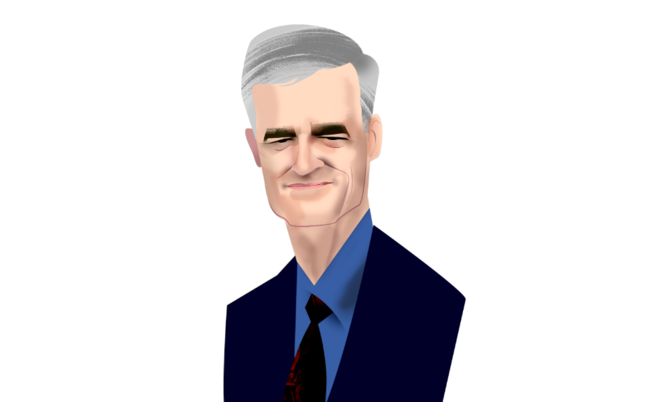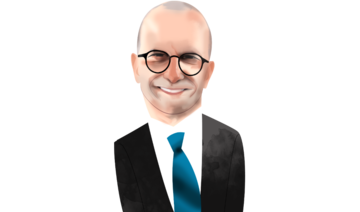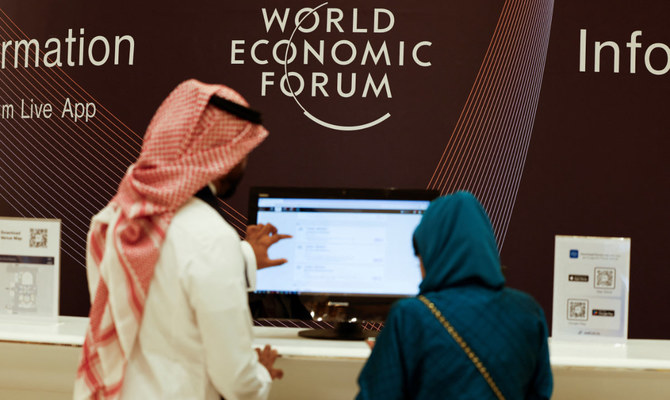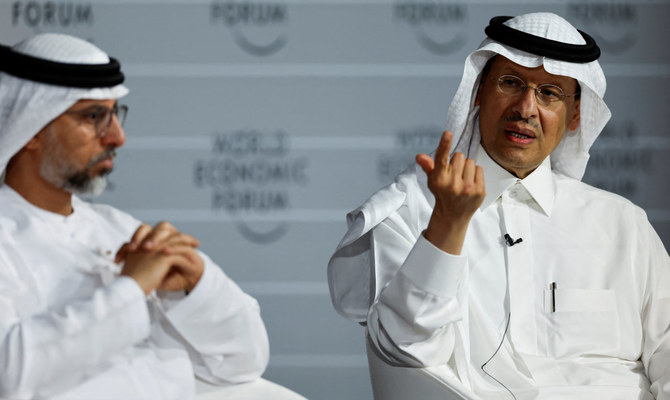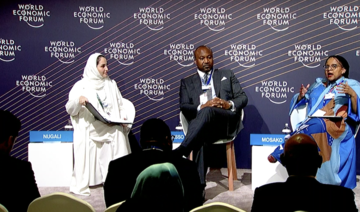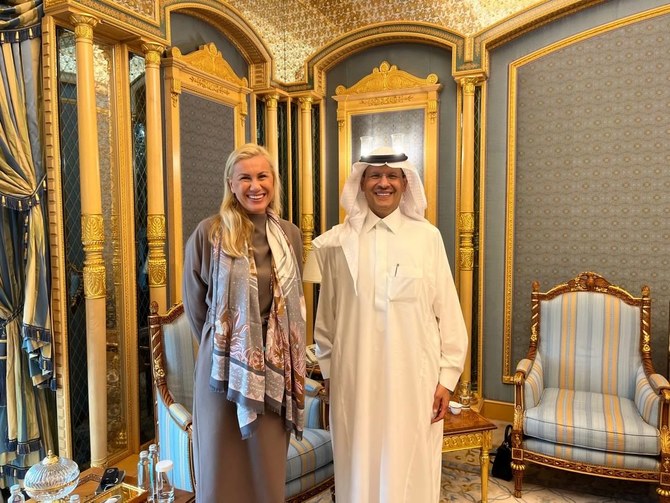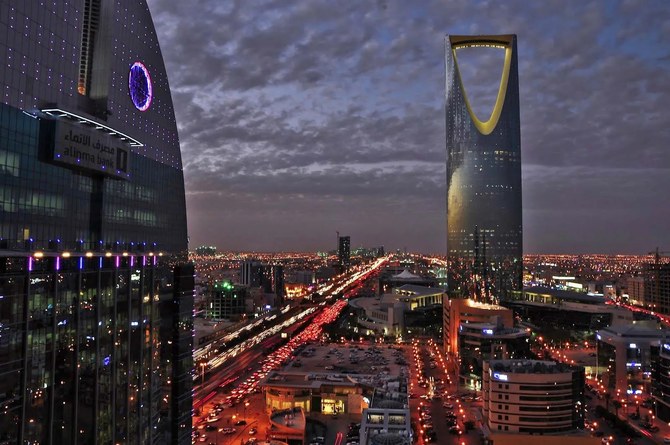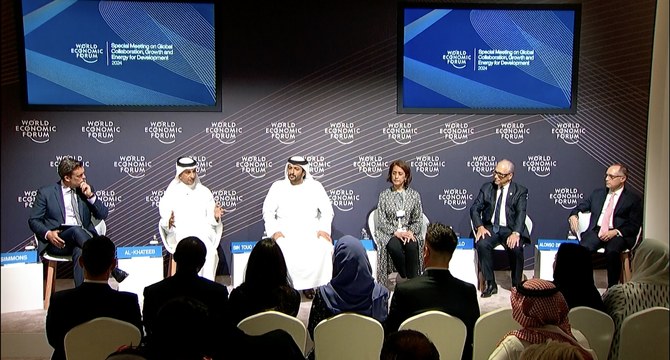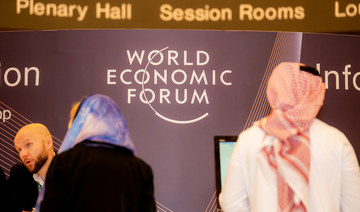LONDON: If Saudi Arabia is serious about the need for more foreign direct investment in the economic transformation underway in the Kingdom, it needs to enlist the support of more world-traveled executives such as Michael Train, president of US engineering group Emerson.
The 129-year-old company, based in the US heartland of St. Louis, Missouri, has made Saudi Arabia a key investment destination ever since it first got involved in the Kingdom 10 years ago, and is looking to ramp up that presence significantly.
Train, in the Kingdom last week for what is becoming a regular trip for him, summed up the US-Saudi entente: “I think US-Saudi relations are pretty strong right now. Obviously there are sensitivities here in the region between the different countries and tensions, but I think there’s an awful lot right with the US-Saudi relationship,” he said.
He was speaking on the sidelines of the Saudi Energy Forum organized by information consultancy Gulf Intelligence in Riyadh, on a day when there had been much fevered speculation about the possibility of US legislation against the Saudi-led Organization of Petroleum Exporting Countries (OPEC) and a possible Saudi response by looking beyond the US dollar for future oil trading, which was subsequently denied.
Train’s response was well-considered: “There are various things out there and I don’t think they are necessarily majority points of view. The good thing about having democracies and other types of government is you get a chance to have those kind of conversations, and that’s interesting. Its about our world progressing forward,” he said.
Emerson’s investments in the Kingdom have been lower key than some of the big joint ventures or projects other global firms have announced, but give the impression the US firm is investing in Saudi Arabia for the long term.
The Dhahran Techno Valley project, opened last year in partnership with the King Fahd University of Petrochemicals and Mining, is an example. “In the hub of the Eastern Province we’re helping to create a terrific facility where we’re able to bring together all the technologies we’re associated with globally ... get people to see them, touch them, experience them, taste them, and share some vision for how they get utilized in the future,” Train said.
Emerson’s participation in the King Salman Energy Park (Spark), one of the megaprojects created under the auspices of Saudi Aramco to generate jobs and boost industrial output is another example. Emerson will eventually have manufacturing capability on the project, sited between Dammam and Al-Ahsa in the east. “We’re making a major commitment there,” he said.
-------
BIO
BORN
•California, 1962
EDUCATION
•Bachelor’s degree in science and electrical engineering, General Motors Institute,
Flint, Michigan
•Master’s in business administration, Cornell University, New York
CAREER
•Executive, General Motors
•Emerson, various posts in Asia
•Emerson, group president and chairman of Emerson Automation Solutions
-------
Train also saw potential in the megaprojects such as the cross-border city NEOM, that are underway. “We don’t build buildings or roads, so others will get those opportunities. What’s interesting about the cities is that the planning associated with those, and the ‘smart designation’, which involves building infrastructure that’s pretty enlightened. It’s going to use a lot of sensing, so that’s a good thing for us. We’re pretty excited. I don’t think the word mega covers the size and scope of these,” he added.
Emerson’s appetite for the Kingdom was first whetted a decade ago when it opened a facility at the huge industrial site at Jubail, which has proved to be a success for the American company. “It’s very popular with petrochemicals customers. We also support the customers in Yanbu from that side with an in-country product and a fast response. That ability to serve customers well to respond quickly is a good thing. These industries are running 24/7 operations and time is very expensive to them in terms of missed opportunities, so having that capability and expertise is very important for customers,” Train explained.
Most of Emerson’s operations in the Kingdom support the energy industry in some form or other. Its new expertise is in the handling and application of data in all aspects of the energy production and usage processes, which can support one of the central planks of government policy: To make Saudi citizens more aware of the value of energy.
Change is hard. Sometimes the best form of learning is failure, right?
Michael Train
The Kingdom is a huge producer of oil and gas, but is also one of the biggest consumers of its own fossil fuel products. One emphasis of the Riyadh forum was the need to encourage consumers to be more aware of their energy usage, and Emerson’s high-technology products — sensors, monitors and alert-systems — provide that ability.
“I think we can help, certainly when they’re looking for technologies that support how they run their operations, or if they want more interesting things, like domestic sensors. We like sensors. We’re trying to bring novel sensors to the market place,” he said.
California-born Train has been at Emerson for most of his working life, after an early stint with General Motors, in a career that has seen him travel around the world, spending much time in east Asia at the group’s offices in Tokyo, Hong Kong and Singapore. He speaks Japanese fluently.
The US firm, for much of its history a manufacturer of industrial and consumer equipment from household fans to aircraft parts, is riding the crest of the big data revolution and working out how its technology can exploit it in the age of digital automation and “Internet of things.”
“There has been a lot of talk about data. I can argue we’re past “big data” now, we’re into huge data. It’s all about collecting the stuff that came from the sensors in the past. We’re trying to bring some new thoughts to the sensor space to give more insight into what’s going on at these processes, these facilities. It all plays together — the sensors, presenting that information, moving that information to users, for analytics, insight, sharing it. In the blockchain world there are different ways of aggregating it,” Train said.
One of the ways it does this is via oil pipeline analytics, which can measure flows and predict problems in deep level facilities, of obvious use in the Saudi energy and petrochemicals industries.
There has been a lot of talk about data. I can argue we’re past ‘big data’ now, we’re into huge data.
Michael Train
Train believes that this technology will help attract a new generation of young Saudi engineers who might otherwise have been lured to the more glamorous worlds of communications technology with the likes of Apple, Google or Facebook. Emerson is on a recruitment drive in the Kingdom to add to the current workforce of 220 employees, 60 percent of whom are Saudi nationals.
“It takes time. You have to build people’s skill sets, which we’re actively doing. We’re in the market to bring talent to these industries. We want people to understand and recognize the high technology content involved in producing energy, producing goods from the oils and gases, medicines, supplying energy to keep our food safe, for transportation. These are noble causes that go beyond the typical technology definitions around Silicon Valley,” he said.
“Over time we’ll get there. We all need to tell our stories. What’s great about our industry is we combine electronics, mechanical engineering and chemical engineering,” he added.
Train is supportive of the economic transformation of Saudi Arabia under the Vision 2030 reform plan, but warned that, like any long-term economic plan, it could face hurdles along the way.
“There has been a lot of change, and the Kingdom has leaned forward to drive that change. I think they’ve welcomed the world to come join them, and encouraged their youth to step forward and go toward a more modern world. They’re also subject to the vagaries of the oil price and their economy gets pushed around a bit because of that.
“But change is hard. Sometimes the best form of learning is failure, right? Something that didn’t come off as planned — sometimes you need that experience,” he said.
Regardless of any challenges, Train sees an increasingly close relationship between the US and Saudi Arabia in the future. “The two countries respect each other and embrace each other. There is technology exchange and certainly there is educational exchange. People live in each others’ countries. The countries come together to some extent,” he said.



